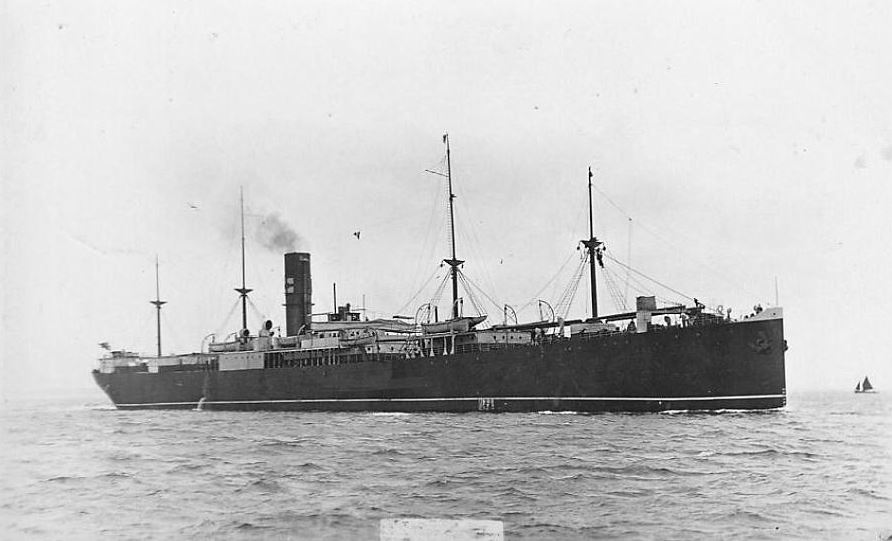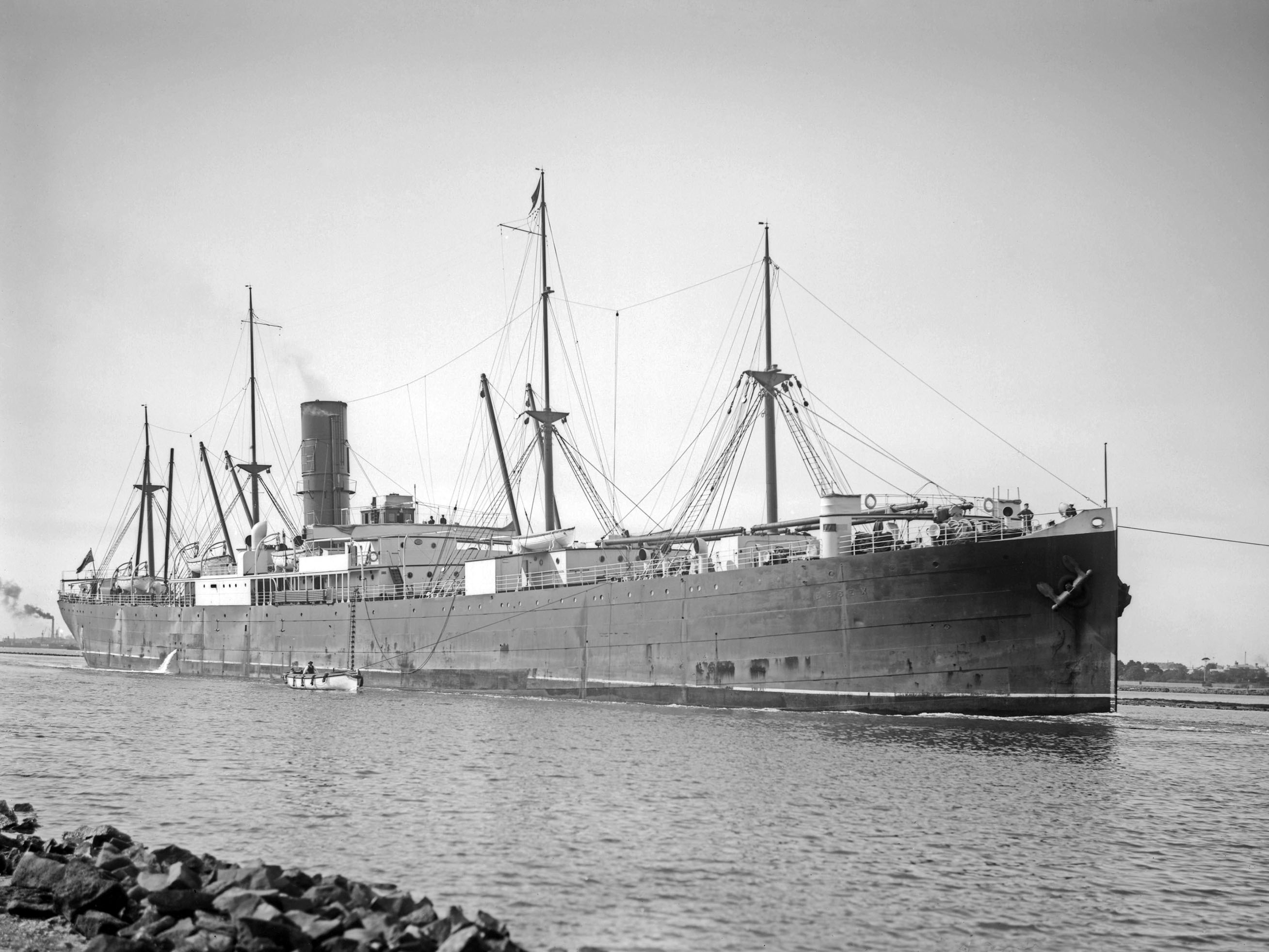Difference between revisions of "SS Essex"
From Our Contribution
(1910) |
|||
| (6 intermediate revisions by the same user not shown) | |||
| Line 1: | Line 1: | ||
| − | {{Infobox | + | {{Infobox ship |
| − | | | + | | image = [[File:SS_Essex.jpg]] |
| + | | caption = P & O Ref: PH-01239-00 | ||
| + | | image2 = [[File:SS_Essex_1.jpg]] | ||
| + | | caption2 = State Library of Victoria | ||
| + | | shipname = SS Essex | ||
| + | | shipowner = Federal Steam Navigation Co Ltd, London | ||
| + | | shipbuilder = John Brown & Co Ltd., Clydebank | ||
| + | | shipyardnumber = 354 | ||
| + | | shiplaunched = 1 Nov 1902 | ||
| + | | shipcompleted = 16 Dec 1902 | ||
| + | | shipinservice = 1903 | ||
| + | | shipoutofservice = 2 Apr 1932 | ||
| + | | shipinservice2 = | ||
| + | | shipoutofservice2 = | ||
| + | | shipreclassified = | ||
| + | | shipID = | ||
| + | | shipfate = broken up at Bo'ness | ||
| + | | shiptype = Passenger / Cargo | ||
| + | | shiptonnage = 7,016 tons | ||
| + | | shiplength = 460.4 ft (140.32m) | ||
| + | | shipbeam = 58.2 ft (17.73m) | ||
| + | | shipdepth = 31.2 ft (9.50m) | ||
| + | | shippropulsion = twin screw | ||
| + | | shipspeed = 13 knots (24.1 kmh) | ||
| + | | shipcapacity = 24 1st class; 200 3rd class | ||
| + | }} | ||
| − | |||
| − | |||
| − | |||
| − | |||
| − | |||
| − | |||
| − | |||
| − | + | ==Remarks== | |
| − | + | Although originaly ordered by Trinder Anderson and Co, she was launched and registered for the Federal Steam Navigation Co Ltd, at a cost of £106,000. In June 1903 while in Sydney bound for New Zealand and South Africa she required work to repair leaks in the seams of her plating. To undertake the work, her cargo needed to be unloaded. | |
| − | |||
| − | |||
| − | |||
| − | |||
| − | |||
| − | + | On 17 Oct 1910 she collided with, and sank, the barge ''Pumba'' in the Brisbane River. On 7 Sep 1916 the Peninsular and Oriental Steam Navigation Company took over the New Zealand Shipping Company and its subsidiary the Federal Steam Navigation Company. ''Essex'' was acquireed from P & O under the Liner Requisition Scheme on 29 Sep 1917. | |
| − | |||
| − | |||
| − | |||
| − | + | On 9 Jun 1918 a torpedoe fired from ''U-96'' narrowly missed her while she was steaming in the St Georges Channel (Irish Sea) between ireland and Wales, Following repatriation of Australian soldiers to Australia he ability to carry passengers was removed and she rejoined the merchant fleet as a cargo ship. However, in 1920 she undertook the role of Cadet Ship, carrying 20 cadets until 25 Oct 1927 when she was sold to the Cie. Internationale de Commerce & d'Armement of Antwerp, renamed as ''Van''. | |
| − | |||
| − | |||
| − | |||
| − | + | On 2 Apr 1932 she was laid up at Antwep until 27 Dec 1932 when she was sold for £5,500 to P & W MacLellan Ltd who had her broken up at Bo'ness in January 1933. | |
| − | |||
| − | |||
| − | |||
| − | |||
| − | |||
| − | |||
| − | == | + | ==Soldiers carried== |
| − | [[Clarence Roy Champion]] | + | ===England to Fremantle 15 June 1919 - 16 July 1919=== |
| + | *[[Clarence Roy Champion]] | ||
[[Category:Ships]] | [[Category:Ships]] | ||
Latest revision as of 00:30, 5 October 2023
Remarks
Although originaly ordered by Trinder Anderson and Co, she was launched and registered for the Federal Steam Navigation Co Ltd, at a cost of £106,000. In June 1903 while in Sydney bound for New Zealand and South Africa she required work to repair leaks in the seams of her plating. To undertake the work, her cargo needed to be unloaded.
On 17 Oct 1910 she collided with, and sank, the barge Pumba in the Brisbane River. On 7 Sep 1916 the Peninsular and Oriental Steam Navigation Company took over the New Zealand Shipping Company and its subsidiary the Federal Steam Navigation Company. Essex was acquireed from P & O under the Liner Requisition Scheme on 29 Sep 1917.
On 9 Jun 1918 a torpedoe fired from U-96 narrowly missed her while she was steaming in the St Georges Channel (Irish Sea) between ireland and Wales, Following repatriation of Australian soldiers to Australia he ability to carry passengers was removed and she rejoined the merchant fleet as a cargo ship. However, in 1920 she undertook the role of Cadet Ship, carrying 20 cadets until 25 Oct 1927 when she was sold to the Cie. Internationale de Commerce & d'Armement of Antwerp, renamed as Van.
On 2 Apr 1932 she was laid up at Antwep until 27 Dec 1932 when she was sold for £5,500 to P & W MacLellan Ltd who had her broken up at Bo'ness in January 1933.

